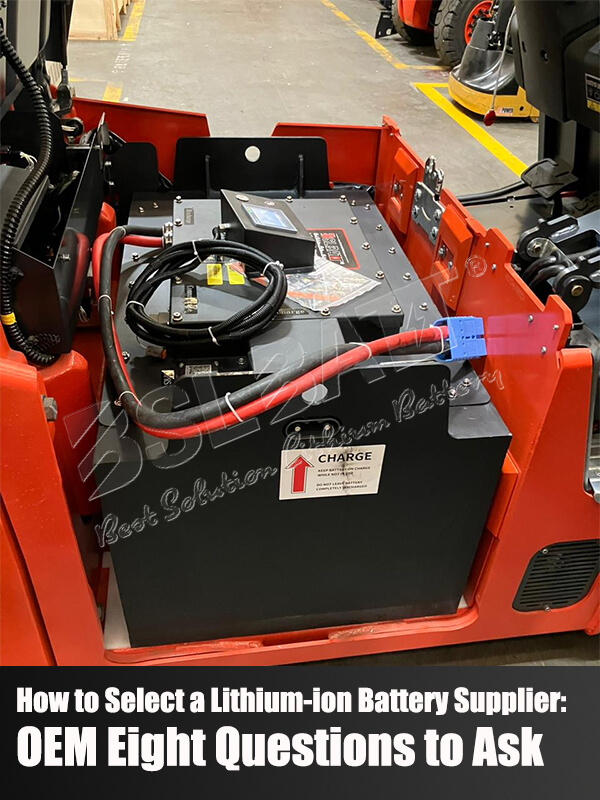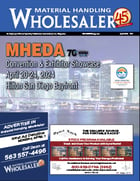
How to select a Lithium-ion Battery Supplier: OEM eight questions to ask
Making the Decision: Lithium-Ion Battery Supplier
The lithium-ion battery market is in a state of flux. Lithium-ion is a relatively new technology that has taken off in the last five to 10 years and demand for these batteries is high and growing. This has attracted many OEMs and created something of a buyer-beware market for OEMs.
Many critical factors must be considered when deciding on a forklift battery supplier. Choosing the wrong lithium-ion battery for a forklift can impact the entire operation of an OEM’s business, from procurement to production. An OEM’s day-to-day operations depend on forklift transportation, and a forklift’s day-to-day operations rely heavily on the battery. Choosing a lithium-ion forklift battery supplier is the first step in determining the success of an OEM’s daily processes. OEMs need suppliers who can meet JIT shipping demands, lead technical innovation, and provide extended technical service. Without that, you may end up with a lithium-ion supplier instead of a lithium-ion partner who will be with you for the long run. That can lead to dissatisfied customers and lost time and money.
Ask the manufacturers these questions:
- To get an idea of how established the company is ask how long they have been in business, how long they have been serving the material handling industry, and whether they have supplied batteries to major OEMs. You could also ask if they offer a full portfolio of batteries including flooded lead-acid, AGM, and lithium-ion. You may want to move on if the manufacturer is a start-up, has been serving the material handling industry for just a few years, or has not supplied batteries to OEMs. Older, more seasoned companies that understand the material handling industry and manufacture and sell a full line of forklift lithium battery products generally know the issues that can damage batteries and shorten their lifespans. They often engineer solutions to these problems in their products.
- How long have you been working with lithium-ion technology? Again, the company probably has a lot to learn if the answer is just a few years.
- What kind of customer support do you provide? Make sure the company has a U.S.-based and Europe customer support line staffed by real people who can answer questions and help your technicians troubleshoot issues. Ask if support is available 24/7 and if the staff includes representatives dedicated to lithium-ion products. Many newcomers to the market simply don’t have the infrastructure to provide that level of service.
- How do you support the dealers who carry your products? You don’t want to work with a supplier who sells products and then forgets about you. To avoid phone tags and long hold times, look for a manufacturer with a systematic approach to communicating with dealers. Ask if the manufacturer has an authorized dealer network through which it trains dealers to sell its products and provides them with the information and materials they need.
- How do you sell your batteries? Many battery manufacturers sell directly to dealerships and are unable to provide the follow-up services dealers may need. Look for a supplier who sells their batteries through a network of trained distributors. These distributors generally know and stand by their products, adding value to your purchase.
- How is your battery different from others in terms of design and engineering? Look for products with UL2580 certification and at least an IP67 rating. This helps protect the battery from damage from vibration, water, and dust and can extend its life. Make sure the battery is embedded and modular expandable.
Ask how the battery is designed to move the damaging heat it generates away from the cells. Most manufacturers do this through inexpensive components called heat sinks because they are easy to make and add on.
But heat sinks should not be the only method of heat management. Well-made batteries reduce the heat generated and allow for natural cooling in the design. This requires more engineering expertise, but it boosts efficiency, improves safety, and prolongs battery life.
- What range does your battery get? To help OEMs, BSLBATT has developed 43 standard modules for lithium batteries of different capacities, which can form parallel building blocks in forklift battery compartments. Up to 20 of these modules can be stacked in parallel, and the total capacity can be tailored to forklift OEM needs. It’s also worth mentioning that OEMs must check usable capacity, not advertised capacity. The stated capacity may be based on the sum of the individual cells within the battery, which does not take into account internal losses like usable capacity. Real-world test data and customer testimonials are the best way to understand the usable range of a battery. This is especially important in the high-capacity, high-current, and relatively low-voltage batteries used in MHE.
- What safety features are built into your battery? Look for a battery with lithium-iron-phosphate cells, one of the most stable lithium-ion battery chemistries. Make sure the BMS features several levels of safety redundancy. That way, if one level fails another will step in, catch the issue, and turn the battery off, protecting you and your property. Ask about UL certifications. Is the entire pack UL-certified or does the manufacturer rely solely on the cell provider’s UL listing? BSLBATT is the first forklift lithium battery in China to obtain UL2580 certification for its complete product line.
Stocking batteries on pricing alone is a big mistake that can impact your bottom line. Be sure to compare the manufacturers’ experience, support services, and products. Investing a little time in your decision can have big payoffs in your sales, service, and customer satisfaction.
BSLBATT -Your trust OEM Lithium-Ion Battery Supplier in China
BSLBATT battery has owned 10 years of OEM battery pack experience for Material Handling, Paper, and Packaging, Food and Beverage, Refrigerated Storage, Manufacturing Industry, Fresh Produce, Wine Industry, Distribution, and 3PL industries applications.
What makes the BSLBATT the Superior Lithium Battery for your Motive Power needs? The answer is quality at every step. The BSLBATT Battery has been validated to over 60 industry quality and safety checks. It has multiple layers of monitoring, safety, and backup redundancies both in the module and the complete unit. The battery is designed and assembled in China., and its assembly facilities meet the stringent ISO 9001:2015 certification standards. In addition, BSLBATT is the first forklift lithium battery in China to obtain UL2580 certification for its complete product line. Maximum and safe transfer of energy is conducted through flexible copper busbar cabling.
Higher quality level than your expectation, our professional engineering all-around evaluates your OEM battery pack solution. We put OEM battery pack working performance first, then choose the suitable Square Aluminum Shell Lithium Iron Phosphate Cell, BMS design, and battery technology.
100% satisfaction feedback from our customers.
If you have other requests, please contact us.









